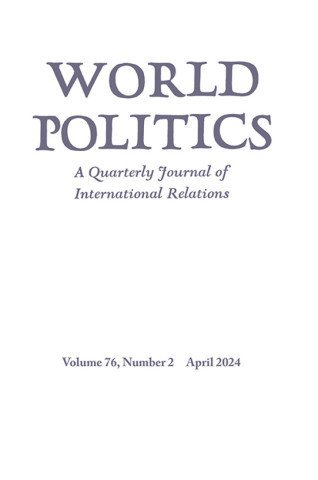国际机构的社会背景
IF 4.5
1区 社会学
Q1 INTERNATIONAL RELATIONS
引用次数: 0
摘要
国家间关系的社会背景为国际机构内的合作奠定了基础。越来越多的学者从注重契约的合理设计和机构的功能需求的理论出发,强调地缘政治。地缘政治既是权力的组成部分,也是社会环境的组成部分,它影响着多边合作。本文探讨了一些理论,这些理论从新的视角将合作视为嵌入国际社会的一个过程。文章强调了将关系变量纳入实证分析的创新发展,以衡量国家间地缘政治的一致性如何影响国际机构的设计和有效性。随着各国建立新的合作俱乐部,支撑多边合作的关系政治也促进了机构的扩散。本文章由计算机程序翻译,如有差异,请以英文原文为准。
THE SOCIAL CONTEXT OF INTERNATIONAL INSTITUTIONS
The social context of relations between states provides the foundation for cooperation within international institutions. In a departure from theories that focus on rational design of contracts and functional demand for institutions, increasingly scholars emphasize geopolitics. Both as a component of power and social context, geopolitics shapes multilateral cooperation. This article examines theories that bring new perspectives on cooperation as a process embedded within international society. It highlights innovative developments to include relational variables in empirical analysis to measure how geopolitical alignment between states impacts the design and effectiveness of international institutions. The relational politics that undergird multilateral cooperation also contribute to the proliferation of institutions as states build new clubs for cooperation
求助全文
通过发布文献求助,成功后即可免费获取论文全文。
去求助
来源期刊

World Politics
Multiple-
CiteScore
8.40
自引率
0.00%
发文量
24
期刊介绍:
World Politics, founded in 1948, is an internationally renowned quarterly journal of political science published in both print and online versions. Open to contributions by scholars, World Politics invites submission of research articles that make theoretical and empirical contributions to the literature, review articles, and research notes bearing on problems in international relations and comparative politics. The journal does not publish articles on current affairs, policy pieces, or narratives of a journalistic nature. Articles submitted for consideration are unsolicited, except for review articles, which are usually commissioned. Published for the Princeton Institute for International and Regional Affairs
 求助内容:
求助内容: 应助结果提醒方式:
应助结果提醒方式:


